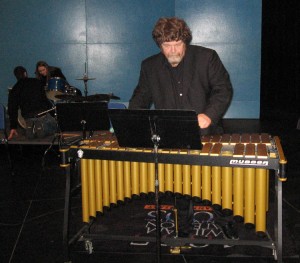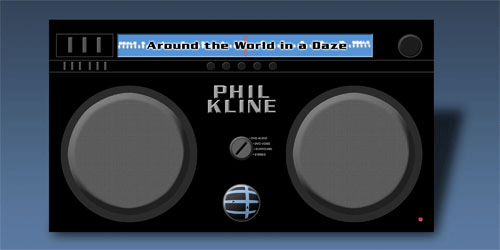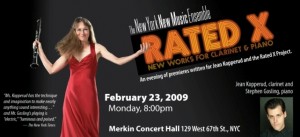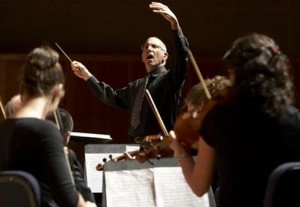The LA Times had an encouraging piece a few days ago about the Obama family’s interest in the non-pop arts (thanks to Alex Ross for the link). Apparently the Obamas recently attended an Alvin Ailey performance at the Kennedy Center, and the First Family has a long history of participation in, and patronage of, dance, classical music, museums, etc. The article, however, is chock full of some appaling elitism. Let’s take a look.
(more…)
Would be in record stores on March 3 if there were such a thing as record stores. Available here.
[youtube]http://www.youtube.com/watch?v=RxKqg0Fwsro[/youtube]
It might be a small, unassuming, and verdantly appointed campus, but within lurks a strong new music contingent! The College of New Jersey is having a faculty composer recital next week.
Peter Jarvis, director of the New Jersey Percussion Ensemble, will be performing the premiere of Carlton Wilkinson’s piece for drum set Jungle 5-7675, a work he commissioned, on the program this coming Thursday. Four other composers on faculty will also be featured.
Music Faculty Composers Recital
Featuring works by Robert Young McMahan, Teresa Nakra, Ralph Russell,
William Trigg, and Carlton Wilkinson.
Thursday, March 5, 2009 @ 8 PM
Mildred & Ernest E. Mayo Concert Hall, Music Building
Free and open to the public.
For more information, please email music@tcnj.edu or visit www.tcnj.edu/~music
TCNJ is located at 2000 Pennington Road, Ewing, NJ 08628-0718.
Parking for music events is available in lots 3-6.
Some enterprising folks have put together an updatable master list of artists, musicians and bands on Twitter. (Yes, now you too can tell Jimmy Eat World what you had for breakfast). Why don’t one of you geeky types with some time on your hands rush over to Google Docs and create a spread sheet where Composers, Real Musicians (like the ones who read S21) and fellow travelers can add their Twitter addresses. We’ll do a link
If you tend to enjoy “litterchur” as well as classical music, you also tend to become aware that authors such as Friedrich Nietzsche, Ezra Pound, and Paul Bowles were intermittently serious about composing music.
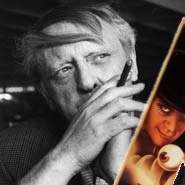 One I did not know about, but was brought to our attention in an email received today, was Anthony Burgess. Always to be known best for his — by no means favorite — novel A Clockwork Orange, Burgess composed more than 175 works, as well as a few opera libretti.
One I did not know about, but was brought to our attention in an email received today, was Anthony Burgess. Always to be known best for his — by no means favorite — novel A Clockwork Orange, Burgess composed more than 175 works, as well as a few opera libretti.
Which brings us to the Harry Ransom Center, an artistic and cultural archive at the University of Texas in Austin, where this Friday evening (the 26th) there’s a concert featuring Burgess’ music, interspersed with readings from his own “litterchur”. Even if you’re not in the Austin area, never fear: it’s also being webcast live. Full information on both the concert and webcast can be had at this page.
Feel free to remind us in the comments, of any other musical authors that slipped our minds.
Our always adventuresome friends at Starkland have outdone themselves this time with an ambitious 65-minute studio composition by Phil Kline commissioned specifically for high-resolution surround sound and DVD. Around the World in a Daze offers Kline’s trademark boombox choirs, as well as (it says here) “an ethereal Ethel string quartet, a weird madrigal, hyper-dense bells (hundreds of thousands at one point), richly mournful multi-tracked vocals, soaring violinistics from Todd Reynolds, and an immersive environment of 15,000 African gray parrots.”
I’m a big fan of innovative packaging (this is one of my all-time favorite books) and Daze is an amazing example of cool presentation. The custom‑designed double digipak includes an Extras disc with a composer-produced music video, a 30-minute interview with Kline and John Schaefer, as well as a 24-page booklet. Release date is March 24. (Yes, I know I had 4 before.)
Ok, let’s have a contest. The first person who can correctly guess the two-part 20th century piano sonata that I would like someone like Blair or Jenny or Sarah to play at my memorial service (not currently on the calendar, as far as I know) gets a copy of Around the World in a Daze. One small catch–you have to write a little review that we’ll publish here on the frontpage so the rest of us will know what you thought.
Two of New York New Music Ensemble’s members, clarinetist Jean Kopperud and pianist Stephen Gosling, will be premiering six new pieces at Merkin Concert Hall on Monday, Feb. 23 at 8 PM.
The pieces were composed for the duo by Eric Moe, Paolo Cavallone, Steve Ricks, David Felder, James Primosch, Jason Eckardt, and Harvey Sollberger.
Apparently they’re calling this the Rated X Project, but we’re hoping everyone at Merkin keeps their clothes on. Really.
 The Moët Trio (Yuri Namkung, violin; Yves Dharamraj, cello; Michael Mizrahi, piano) had the first half of the program, and they opened with John Zorn’s Amour fou. The Zorn was a surprisingly modernist piece for a composer who is known as a pivotal figure in the downtown scene, and while I can’t say I liked it I definitly respected it. It was one of those pieces where every note was exactly the right note for what the piece was trying to do, from the scraping harmonics of the opening theme to the moments of wildness that occasionaly break out of the otherwise fairly chilled out atmosphere. Next was Richard Danielpour’s A Child’s Relquary, which was omposed in response to the death of conductor Carl St. Clair’s 18 month old son in 1999. The piece is romantic and lyrical–cinematic at times–and even in the context of a trio Danielpour’s mastery of orchestration is plainly evident.
The Moët Trio (Yuri Namkung, violin; Yves Dharamraj, cello; Michael Mizrahi, piano) had the first half of the program, and they opened with John Zorn’s Amour fou. The Zorn was a surprisingly modernist piece for a composer who is known as a pivotal figure in the downtown scene, and while I can’t say I liked it I definitly respected it. It was one of those pieces where every note was exactly the right note for what the piece was trying to do, from the scraping harmonics of the opening theme to the moments of wildness that occasionaly break out of the otherwise fairly chilled out atmosphere. Next was Richard Danielpour’s A Child’s Relquary, which was omposed in response to the death of conductor Carl St. Clair’s 18 month old son in 1999. The piece is romantic and lyrical–cinematic at times–and even in the context of a trio Danielpour’s mastery of orchestration is plainly evident. After a brief intermission, the Attacca Quartet (Amy Schroeder, violin; Keiko Tokunaga, violin; Gillian Gallagher, viola; Andrew Yes, cello) launched into Gyorgy Ligeti’s String Qurtet No. 1, “Metamorphoses Nocturnes.” As with so much Ligeti, the piece starts out in a nice yet seemingly unremarkable way–chromatic lines over a drifting, slithering accompaniment. But Ligeti has a better intuitive sense of effective overall dramatic structure than just about anybody in the business, and that opening music evolves and builds, growing in intensity, and by the time the athletic second theme arrives about a minute and a half in everything makes sense. Those opening moments turn out to be critical to the overall architecture of the piece. After the Ligeti, which was the highlight of the evening, Attacca offered an excellent rendition of the String Quartet in G minor, Op. 10 by some guy named Claude Debussy. But that dude bought the farm way back in 1918, so I feel no obligation to talk about his piece.
After a brief intermission, the Attacca Quartet (Amy Schroeder, violin; Keiko Tokunaga, violin; Gillian Gallagher, viola; Andrew Yes, cello) launched into Gyorgy Ligeti’s String Qurtet No. 1, “Metamorphoses Nocturnes.” As with so much Ligeti, the piece starts out in a nice yet seemingly unremarkable way–chromatic lines over a drifting, slithering accompaniment. But Ligeti has a better intuitive sense of effective overall dramatic structure than just about anybody in the business, and that opening music evolves and builds, growing in intensity, and by the time the athletic second theme arrives about a minute and a half in everything makes sense. Those opening moments turn out to be critical to the overall architecture of the piece. After the Ligeti, which was the highlight of the evening, Attacca offered an excellent rendition of the String Quartet in G minor, Op. 10 by some guy named Claude Debussy. But that dude bought the farm way back in 1918, so I feel no obligation to talk about his piece.The ‘reenvisioned’ Alice Tully Hall at Lincoln Center opens Sunday. I hope they haven’t moved the chairs closer together. It was the only concert hall in New York where you could walk across a row without stepping on a fellow patron’s feet.
[youtube]http://www.youtube.com/watch?v=oaWYSvlCZH4[/youtube]
While well-known for his writings about music, including books about Elliott Carter and George Gershwin, David Schiff is also a prolific and active composer. A professor at Reed College, he’s visiting New York this week to hear the American Composer’s Orchestra premiere a revamped version of Stomp, a piece that celebrates the music of James Brown. The concert, part of the Orchestra Underground series, also includes premieres by Margaret Brouwer and Kasumi, Rand Steiger, Fang Man, and Kati Agócs.
Carey: Stomp was written in 1990 for Marin Alsop. How did you decide to write in homage to James Brown?
Schiff: I was asked for a concert opener and somewhere in the process I realized that one of my rhythmic motives was from James Brown’s “I Feel Good” (as recorded Live at the Apollo). I then re-conceived the piece as a tribute.
Carey: Have other rock or jazz legends figured in your music?
Schiff: There’s a big Motown section in my Scenes from Adolescence (1987) and my Slow Dance for orchestra (1989), written for the Oregon Symphony, has a lot of Charles Mingus in it, but I have also had the great honor of working with two living legends in jazz, Regina Carter and Marty Ehrlich.
Carey: What’s “re-lit” about this new version for the ACO?
Schiff: ACO asked me to reduce the size of the orchestra slightly to fit in Zankel Hall. This gave me the opportunity to re-score the entire piece. The wind section now is much better suited to the style of the piece: flute, E flat clarinet, two saxes, trumpet horn, trombone and tuba. But there are also a lot of musical changes everywhere. I think that in the years since I first wrote Stomp I have become more experienced with the style. The new version is much hotter than the original–even though the orchestra is smaller.
Carey: You’re currently at work on a book about Duke Ellington. Is that research infiltrating your composing at all?
Schiff: Ellington’s music influences everything I do. I go to school with his music every day and I find his melodies, rhythms, harmonies and instrumentation endlessly inspiring.
